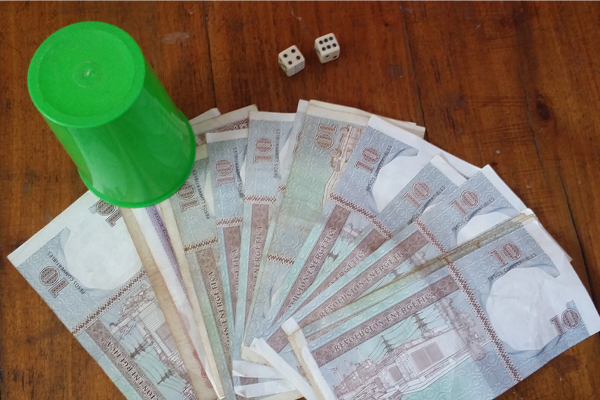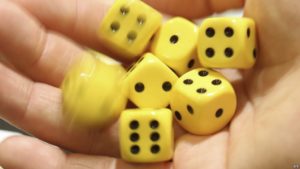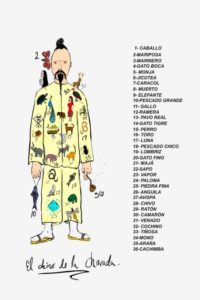On a wide rectangular wooden table, nine people are still waiting for the route of three small nacre dice, which after hitting the front crossbar of the board revolve in a diabolical suspense.
In those thousandths of a second, silence can be cut with a scissor. It looks like a frozen scene. The players look exclusively at the dice.
It is rare that in a municipality of Cuba there is no “bule”. There are gaming houses for all budgets; all illegal.
On the perpendicular table, just below each player, thick stacks of bills. On one corner of the board, the business owner, a mulatto sitting in an iron chair with a can of biscuits between his legs, filled half the money. Absorbed, he also follows the fortuitous trajectory of the dice.
At last the dice stop and the combination of dialed numbers cancels the play. The gamblers release a deep sigh, the gloomy silence is broken and, between the smoke of cigars and the noise, it looks like a crazy house.
“I’m going to a board in fulas (one hundred dollars) that you’re now little,” snaps a black man in mechanic overalls. He is answered by a gray-haired man, who counts the money by running his fingers through the corners of his lips.
“Big until death, I pay your move,” he replies. These people play silot. The oldest bettors count, that the silot is native of the oriental regions. You can play as many people fit around a board.
The bets are placed in front of each player. One of the players plays the bench. When two dice combine (for example, a pair of one and another five, the solitary die marks the move), then each bettor places his shot.
To beat the five you have to throw a six, or a magic shot where the three dice mark the same number. When the bank triggers the six, or three equal digits, it automatically collects the money placed on the table.
The mulatto who drinks one beer after another, enters in his cookie can 10% of the amount of money collected. If the bank rolls a one, each player cashes the bet amount of money.
In popular slang, clandestine gambling houses are known as “burles”.
It is rare that in a municipality of Cuba there is no mockery. In general, variants of poker, longana, baccarat or silot are played. There are houses of games for all budgets.
In some you can play with 500 pesos ($ 25). Others are more exclusive: each player must carry 5,000 pesos (200 dollars).
Gambling is not new in Cuba. When Fidel Castro came to power in 1959, the lottery and other betting games were practiced legally on the island.
The casinos were run by the mobster Meyer Lanski. And the national lottery, a perfect wild card for corrupt politicians to steal sacks. From housewives to entrepreneurs they made their bets. But Castro abolished the casinos, the billboards and the lottery. Bet games were prohibited by law.
In the 21st century, to “Omar”, a ball banker has not fared badly:
“I have a pick up of 8,000 to 10,000 pesos a day in each round, now there are prizes in the afternoon and in the evening, the results are followed by the Miami lottery.”
In any corner of Cuba people sing the results. “Big dead, fine stone and automobile,” a neighbor shouts from the second floor to her friend, who shakes her head from side to side and replies: “I went blank, I’ve been behind the pig for two months and nothing”.
The dialogue could be a hieroglyph for a foreigner. But let’s explain:
The Creole lottery is played from 1 to 100 and each number has one or several meanings. The fixed is rewarded, between 80 and 100 pesos, according to the bank, and two runs that are paid at 25 or 30 pesos. The terminals and the hundreds are also played.
If we give credit to bankers of the ball and owners of illegal gambling houses, for 10 years, the police look the other way after receiving money from under the table.
“The Government should legalize the game,” says ‘Hernando’, another friend of the banned games in Cuba. Omar thinks otherwise: “If the State puts its hands in the little ball, it screws up the ‘bisne’ (business), it’s better that things continue as they are.”
The most popular games in Cuba are dice, cards, silot, longana and the little ball. But are not the only ones. There are cock and dog fights, horse races, illegal races of cars or motorcycles and computer games on the net where bets are high.
LAS APUESTAS EN JUEGOS ESTÁN PROHIBIDAS, PERO LOS CUBANOS PREFIEREN: LOS DADOS, NAIPES Y LA BOLITA.
En una amplia mesa rectangular de madera, nueve personas siguen expectantes el recorrido de tres pequeños dados de nácar, que luego de chocar contra el larguero frontal del tablero giran en un diabólico suspense.
En esas milésimas de segundo, el silencio se puede cortar con una tijera. Parece una escena congelada. Los jugadores miran exclusivamente hacia los dados.
Es raro que en un municipio de Cuba no exista un “bule”. Hay casas de juegos para todos los bolsillos; todas ilegales.
En la mesa perpendicular, justo debajo de cada jugador, gruesos fajos de billetes. En una esquina del tablero, el dueño del negocio, un mulato sentado en una silla de hierro con una lata de galletas entre las piernas llena hasta la mitad de dinero. Absorto, él también sigue la trayectoria fortuita de los dados.
Por fin los dados se detienen y la combinación de números marcados anula la jugada. Los apostadores sueltan un suspiro profundo, se rompe el silencio lúgubre y, entre el humo de cigarros y la bulla, aquello parece una casa de locos.
“Voy una tabla en fulas (cien dólares) que ahora vienes chiquito”, espeta un negro con overol de mecánico. Le contesta un señor canoso, que cuenta el dinero pasándose los dedos por la comisura de sus labios.
“Grande hasta la muerte, pago tu jugada”, responde. Estas personas juegan silot. Cuentan los apostadores más viejos, que el silot es oriundo de las regiones orientales. Pueden jugar cuantas personas quepan alrededor de un tablero.
Las apuestas se colocan al frente de cada jugador. Uno de los jugadores hace de banco. Cuando dos dados combinan (por ejemplo, una pareja de uno y otro cinco, el dado solitario marca la jugada), entonces, cada apostador coloca su tiro.
Para ganarle al cinco hay que tirar un seis, o un tiro mágico donde los tres dados marquen el mismo número. Cuando el banco dispara el seis, o tres dígitos iguales, automáticamente recoge el dinero puesto en la mesa.
El mulato que bebe una cerveza tras otra, introduce en su lata de galletas el 10% del monto de dinero recogido. Si el banco tira un uno, cada jugador cobra la cantidad apostada de dinero.
En el argot popular, las casas clandestinas de juegos se les conoce como “burles”.
Es raro que en un municipio de Cuba no exista un burle. Por lo general, se juegan variantes del póquer, longana, bacará o silot. Existen casas de juegos para todos los bolsillos.
En algunas se puede jugar con 500 pesos (25 dólares). Otras son más exclusivas: cada jugador debe portar 5.000 pesos (200 dólares).
Los juegos de apuestas no son nuevos en Cuba. Cuando Fidel Castro llegó al poder en 1959, la lotería y otros juegos de apuestas se practicaban legalmente en la isla.
Los casinos eran regentados por el mafioso Meyer Lanski. Y la lotería nacional, un comodín perfecto para que políticos corruptos robaran a sacos. Desde amas de casa hasta empresarios hacían sus apuestas. Pero Castro abolió los casinos, las vallas de gallos y la lotería. Los juegos de apuesta fueron prohibidos por ley.
En el siglo XXI, a “Omar”, un banquero de bolitas no le ha ido mal:
“Tengo una recogida de 8.000 a 10.000 pesos diarios en cada tanda. Ahora hay premios por la tarde y en la noche. Los resultados se siguen por la lotería de Miami”.
En cualquier esquina de Cuba las personas cantan los resultados. “Muerto grande, piedra fina y automóvil”, le grita una vecina desde un segundo piso a su amiga, que mueve la cabeza de un lado a otro y le responde: “Me fui en blanco, hace dos meses que estoy detrás del puerco y nada”.
El diálogo pudiera ser un jeroglífico para un extranjero. Pero expliquemos:
La lotería criolla se juega del 1 al 100 y cada número tiene uno o varios significados. Se premia el fijo, entre 80 y 100 pesos, según el banco, y dos corridos que se pagan a 25 o 30 pesos. Igualmente se juegan los terminales y las centenas.
Si damos crédito a banqueros de la bolita y dueños de casas ilegales de juegos, desde hace 10 años, la policía mira para otro lado después de recibir dinero por debajo de la mesa.
“El Gobierno debiera legalizar el juego”, dice ‘Hernando’, otro amigo de los juegos prohibidos en Cuba. Omar piensa lo contrario: “Si el Estado mete las manos en la bolita nos jode el ‘bisne’ (negocio). Es mejor que las cosas sigan como están”.
Los juegos más populares en Cuba son dados, naipes, silot, longana y la bolita. Pero no son los únicos. Hay peleas de gallos y perros, carreras de caballos, carreras ilegales de autos o motos y juegos de computadora en la red donde las apuestas son elevadas.
Agencies/RadioMarti/Ivan Garcia/Extractos/ Internet Photos/ Arnoldo Varona/ TheCubanHistory.com
THE CUBAN HISTORY, HOLLYWOOD.










